Just a couple of years back, Indian Health experts were in a bewildering state of mind, when Goa was marked to have the highest number of colon cancer cases in India. The veterans made every possible effort to understand reasons that made Indian population so susceptible to Colon cancer. Vigorous research revealed that our choice of food and poor lifestyle are to be held responsible for this declining health standards. However, a lot more could be added to this list and has been discussed later.
Nevertheless, today we do have this one assuring piece of information related to colon cancer. A bit of vigilance related to your personal health, a brief understanding of symptoms or early signs and regular health screening tests can prevent you from developing this bowel cancer. 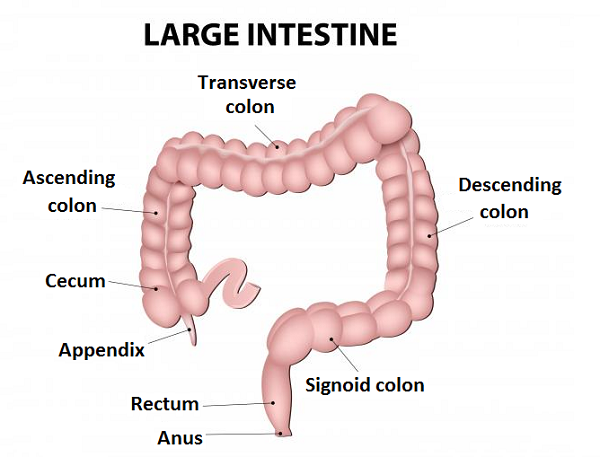
Colon is nothing but the large intestine and marks the end of human digestive system. The right hand side of colon is responsible for absorbing water and salts from food. And the left hand side stores and regulates evacuation of stool. Last few inches of colon is known as the rectum which terminates with anus and eliminates waste from body.
What is Colon Cancer?
Any unwanted or uncontrolled cell growth in the large intestine is known as colon cancer. Colon cancer is also sometimes referred to as colorectal or bowel cancer. This is when cells from both colon and rectum turn to be cancerous.
In the beginning, small tumor like structures known as adenomatous polyps develop in the inner walls of large intestine. These are noncancerous or benign, and if detected at an early stage, these can be eliminated and stopped from developing into malignant cancer cells. However, many a times patients fail to identify early signs caused by polyps and they only visit a doctor at a later stage when they are diagnosed with Colon Cancer. Based on the stage of cancer various surgical methods are adopted to treat colon cancer & colorectal Cancer .
Both males and females can get affected with this health ailment; however, men are at a greater risk of developing colon cancers.
Colon Cancer – Causes and Risk Factors: 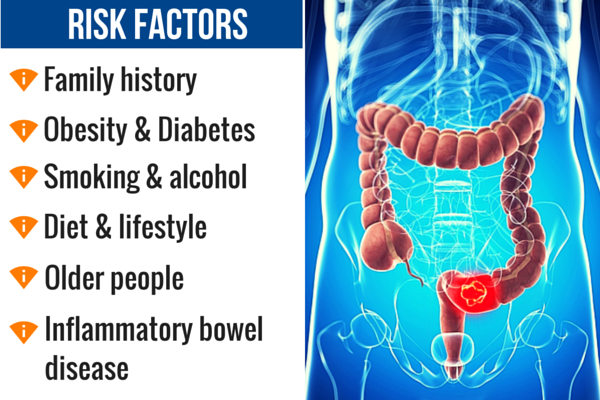
Normal and healthy cells grow, divide and die. However, cells that grow or divide vigorously and never die are what we know as cancer cells. There cannot be one specific reason behind colon cancer, or for that matter any type of cancer you know about. Nevertheless, the below listed factors do contribute in disrupting normal cell metabolism leading to colon cancer:
1. Your diet and overall lifestyle:
A diet rich in fat and low in fiber is said to be one of the prime causes of colon cancer. Researchers in India say that, high rates of processed meat consumption in Kolkata make the inhabitants very prone to colon cancer. The exact connection between colon cancer and this form of diet is yet to be learned and research is still going on. Till then, curbing out too much fat and squeezing in a bit of fiber rich food is the best thing you could do.
2. Genes and Family history:
Genes direct every function of cells. They tell cells when to divide, when not to divide and when to die. When people are born with faulty genes, it is evident that normal functioning of cells is also disrupted. Thus, these people are very prone at developing cancer in the large intestine. Children born to parents suffering from colon cancer are more likely to develop the same later in life. There are three syndromes associated with colon cancer; that are:
- Hereditary nonpolyposis colorectal cancer/Lych Syndrome
- Familial Adenomatous Polyposis
- Gardner Syndrome
3. Acute and inflammatory bowel disorders, such as Crohn’s disease can end up to colon cancer.
4. Patients suffering from prolonged Diabetes and obesity remain at higher risk of suffering from Colon Cancer
5. Excessive alcohol consumption and heavy smoking can lead to formation of cancer cells in colon
6. Older people remain at greater risk of suffering from colon cancer
7. Radiation therapies used to treat other forms of colon cancer can make you susceptible to colon cancer development
Colon Cancer – Symptoms and Early Signs:
Symptoms can vary depending on the stages of cancer and overall health condition. 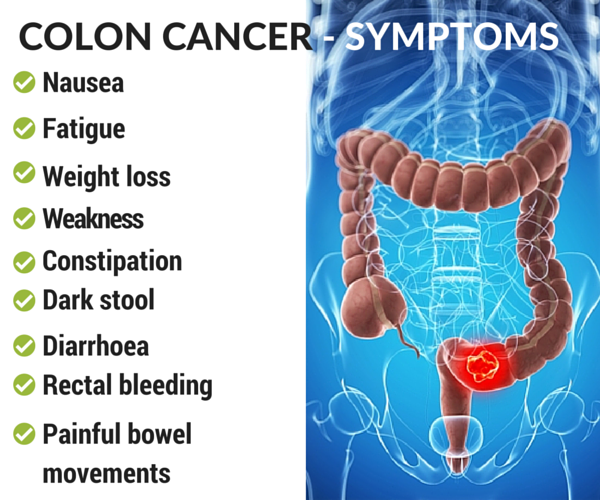 However, following colon cancer symptoms can be sufficient to visit your doctor at the earliest:
However, following colon cancer symptoms can be sufficient to visit your doctor at the earliest:
- Rectal bleeding that is taken to be an indication of underlying hernia, can also suggest Colon cancer
- A protruding stomach without considerable weight gain
- Abdominal problems such as pain, gas or cramps
- Change in bowel movements or character or consistency
- Loss of weight that is unexplained
- A continuous fatigue or weakness
- Nausea and vomiting
- Narrow or ribbon like stool
- Suffering from continuous diarrhea and constipation
- Anemia can also be another very important indicator of colon cancer
- Painful bowel movements
Colon Cancer Diagnosis– Exams and Tests:
- Digital Rectal Exam: A quick and not so painful test where your doctor inserts a lubricated finger through the anus to reach rectum and thus check if the bleeding is originating from rectum.
- Colonoscopy – An endoscopic test that inserts a plastic tube attached with a camera into the colon through your anus. The camera sends back images of possible tumors, polyps and cancer cells.
- Flexible Sigmoidoscopy – Very similar to endoscopic test; however, does not go as deep as colon and restricts to left part of colon and entire rectum.
- Barium Enema: A procedure where patients are made to drink a solution containing barium. Just after a short span, when barium lines large intestine, an x ray of the colon and rectum are taken.
- Blood test for CEA: Carcinoembryonic antigen (CEA) is a substance produced by all cancer cells. A blood test may be done to detect CEA and thus serves as a clue. However, it can be very helpful for prognosis.
- Fecal Ocult Blood Test: A special laboratory test that checks for blood in small traces of stool.
Besides, various imaging tests and blood tests such as, CBC can also help in better cancer staging.
Colon Cancer – Staging and Prognosis
Once a patient has been diagnosed with colon cancer, the doctor essentially proceeds to cancer staging and prognosis. 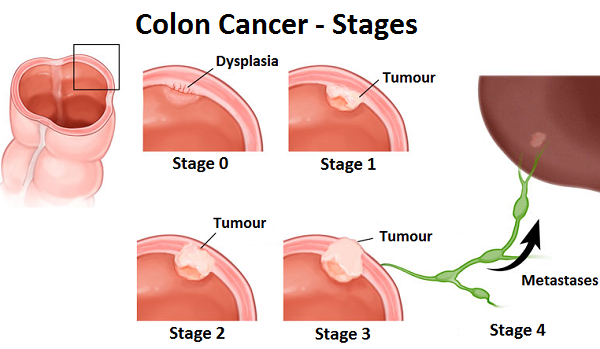 These are important steps that decide the type of treatment to be opted for and how well the body may react to the treatment. Besides, the doctors can also decide chances of survival, especially when the cancer is at a later stage.
These are important steps that decide the type of treatment to be opted for and how well the body may react to the treatment. Besides, the doctors can also decide chances of survival, especially when the cancer is at a later stage.
Similar to all cancers, colon cancer also has four different stages; as explained below:
- Stage 1 implies that cancer has not spread beyond colon walls.
- Stage 2 indicates that the cancer spreads beyond colon wall but has not reached the lymph nodes.
- Stage 3 is slightly difficult as the cancer reaches lymph nodes and may spread to other organs.
- Stage 4 is when the cancer grows and spreads to few of the nearby organs – liver and lungs.
Cancers detected at an early stage, say stage 1 have more than 90% chances of survival. Stage 2 can have 60 – 80 percent chances of survival. While stage 3 and 4 have very thin survival rates approximated to 30 or 40 percent.; and may even go down to 10% or so.
Treatment options for Colon Cancer:
Depending on the stage of your cancer and prognosis results, your doctor determines the best treatment option. The following section discusses the various colon cancer treatment options in brief: 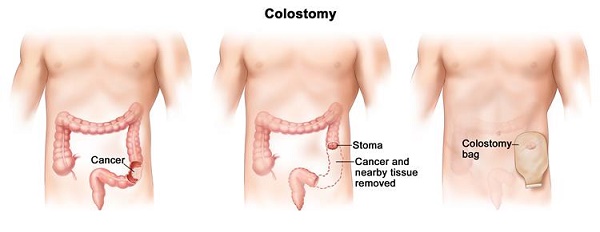
- Local Excision: Early stage cancers can be treated through local excision procedure that does not involve any abdominal cuts. The doctor instead inserts a long tube attached with a cutting tool inside the colon through rectum. This cutting tool then cuts off the polyps and early stage cancers. Thus, any probability of severe colon cancer is thus completely nullified.
- Partial Colectomy: Mid stage colon cancer requires these surgeries that involve partial removal of colon sections that contain cancerous cells. Once the damaged part of your colon is removed, the doctor reconnects healthy section to your rectum. If in case, this reconnection is not feasible, you will have to undergo another procedure known as Colostomy. This procedure involves creating a hole on the abdominal wall that opens to a bag on the outside of the body. The remaining part of the colon that could not be connected to the rectum finds its way into the opening and the bad for waste removal.
- RF ablation: RF or the radiofrequency ablation is a surgical procedure that is carried out under general anesthesia. This procedure involves killing cancer cells through electrodes produced by special probes. The probe can either be inserted through skin or via a hole in abdomen.
- Chemotherapy: A procedure that involves treating cancer cells through use of drugs. This is not specific to colon cancers alone and is rather used as a common treatment procedure for various types of cancer. Chemotherapy is also used to shrink cancer cells that have spread to other parts of body.
- Radiation Therapy: A procedure that uses high energy X rays or any other kind of high energy radiation that penetrates through body and kills cancerous cells.
- Palliative care: Every cancer patient needs to undergo this palliative care procedure. This procedure involves a team of doctors, nurses and other experts who work in close association with patients and their families to administer pain relieving procedures. They work to reduce the severity of symptoms and also heal the discomfort that lingers after repetitive treatment procedures. Patients who undergo palliative care along with main stream treatment procedures have shown to have better response, quick recovery and higher survival rates.
Colon Cancer Prevention – It’s all in your own hands:
Colon cancers are one of the easiest cancers to prevent. So, why to get into these hassles of surgeries when you can very well keep them away? 
Here are some essential colon cancer prevention techniques. Read them and stay healthy:
- Screening test: Prevent cancers by eliminating polyps. Screening tests such as Fecal Occult Blood test, colonoscopy or sigmoidoscopy are few of the screening tests available. Start getting tested at an early age of 40 years or so.
- Check on your weight: Similar to other cancers, being overweight brings you to greater risk of large intestine cancers as well. Therefore, keeping a check on your weight is important to prevent colon cancer or any other cancer for that matter.
- Abstain from smoking and alcohol consumption: Smoking and alcohol can bring about several detrimental effects on your body including colon cancers. Therefore, abstaining from these is the best thing you could do with your health.
- Restrict processed meat consumption: Studies have shown that processed meat consumption can make you more susceptible to colon cancers. Therefore, keeping a check on these food items is suggested.
- Calcium, multivitamin folate and Vitamin D: Calcium and Vitamin D have shown great results in preventing colon cancers. Therefore, taking 1000 to 1200 mg of calcium per day and 1000 international units of Vitamin D can work great for you. Getting a Vitamin D deficiency test can also be very useful. Multivitamin folate also helps to prevent colon cancers. However, discuss with your doctor to know about multivitamin doses.
Colon cancers are the third most common cancer in USA and are increasingly becoming more and more common in India. However, unlike other forms of cancer, these cancers are very easy to prevent and treat. Therefore, now that you have learned about the early signs and preliminary treatment methods, visit your doctor if you have symptoms indicative of colon cancer. Early prevention is longer life!